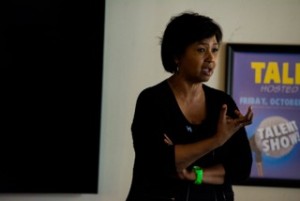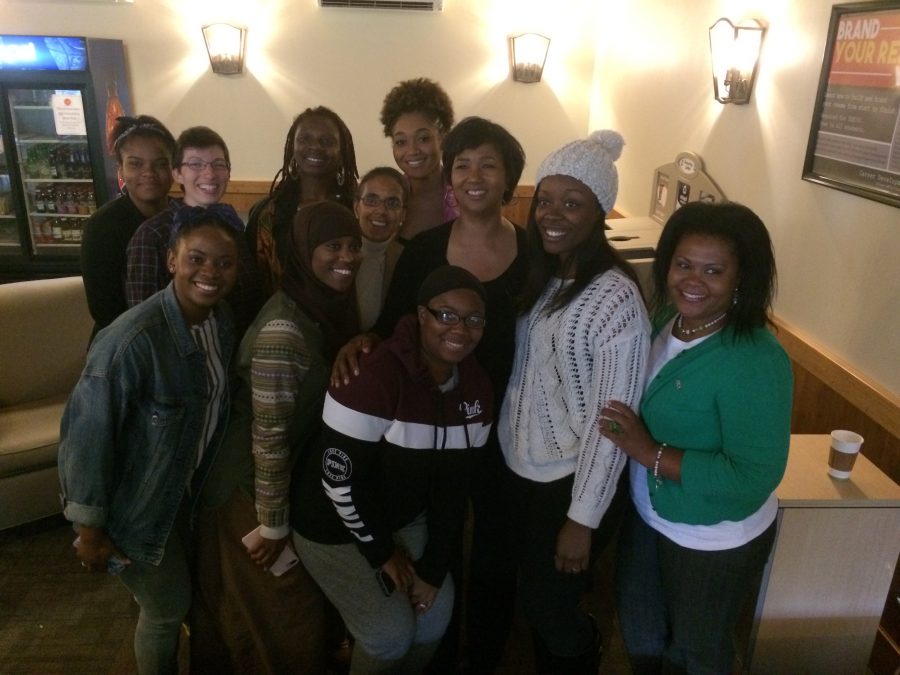Photo: Chatham students pose with Mae Jemison inside of the Carriage House
Photo Credit: Janelle Moore
Author: Edymar Hurtado
Mae Jemison, the first female African-American astronaut, visited Chatham University to talk about her life, career and her support for Hillary Clinton in the presidential elections. About 40 people attended her conference in the Carriage House last Monday.
The president of the Young Democrats, Jenna McGreevy, welcomed everyone in the room and thanked Jemison for her attendance. “This is one of all the activities we are making to impulse students to go and vote for the future of our country,” she said.
The talk was more intimate compared to regular speeches. Jemison wanted to have a close conversation with the students, so she started talking about the role of people in our world. “If you wait for tomorrow, tomorrow comes. If you don’t wait for tomorrow, tomorrow comes,” she said.
She explained that no matter what you expect, the world moves on, but that the role of society is to determinate what moves on too. “Whether or not we actively do something, our decision not to participate is also a choice,” she continued. These words were related to the decisions of the voters facing this election, but before getting deep in this topic she made a pause to share about her life.
She is a physician and a college professor, but she also has a Bachelor of Science in Chemical Engineering, a Bachelor of Arts in African and Afro-American Studies and a Doctor of Medicine.
Even though her background is related to engineering and medicine, she also is involved with social sciences. She’s done lots of work in linguistics and culture.
She said that “science is shaped by the people who participate.” That’s what helped her to understand that every objective area is influenced by subjective elements, because they are the ones who ask the questions, think on possible solutions and make decisions.
She compared this experience with the coming weeks. It is a time for decisions, time for choices, time to participate.
“Why is it important for you to go out and vote?” she asked the audience. Because important things like science, technology and culture are determined by the perspective of who is elected.
She showed her support for Hillary Clinton by saying that “she has incredible experience and quality to tell you that she has interest in our nation.” According to her, evidence is the most important aspect to take in consideration.
In science and engineering, professionals look for evidence to consider something true, but also in social science people look for evidences, proofs, to accept a theory or to simply to expose a phenomenon.
Jemison agrees that Clinton has shown enough evidence in her campaign and her debates to show her skills to lead the country. And as Jemison said at the beginning, who is elected makes a difference. “Policy makes a difference in technology, in development, in the future, and we want that in the right hands,” she added.
 Ending her speech by referring to Clinton’s opponent, Donald Trump, Jemison said that she just had one comment: “Government is not a business. Government has different priorities, needs and ideas. So if one person is doing well at business it is not the same as doing well in policy.” She encouraged everyone to “look at the evidence and go to vote.”
Ending her speech by referring to Clinton’s opponent, Donald Trump, Jemison said that she just had one comment: “Government is not a business. Government has different priorities, needs and ideas. So if one person is doing well at business it is not the same as doing well in policy.” She encouraged everyone to “look at the evidence and go to vote.”
For one of the students in the audience, Jessica Keller, a junior Chemistry major, when she saw that the event was featuring the first female African-American astronaut she said: “I was intrigued to hear what she had to say because I believed she would have a unique perspective to speak from.”
That’s what made her attend the event. As someone who focuses her studies on science, “it was really great to hear from someone that has broken down barriers that to this day exist in scientific fields.”


